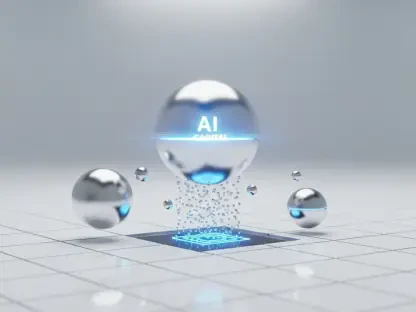In an era where technology evolves rapidly, artificial intelligence (AI) agents are emerging as transformative forces within software development. Companies are increasingly deploying these intelligent entities to revolutionize how software is conceived, built, tested, deployed, and maintained. As enterprises continue to seek efficiency, productivity, and security, AI agents are positioned as indispensable contributors to the ever-evolving landscape of software development.
Emergence and Evolution of AI Agents
AI agents have quickly marked their presence in the software development arena. Emerging from the convergence of machine learning, computational intelligence, and sophisticated algorithms, these agents have moved beyond traditional mechanization to embody capabilities that resemble human cognitive functions. Comprised of generative models, automated reasoning, and context-awareness, AI agents are now pivotal in reshaping both the culture and practices in technology-driven sectors. Their significance stems not only from heightened productivity but also from the strategic advantages they deliver, offering an innovative edge to industries prepared to harness their full potential.
Core Features of AI in Software Development
Automated Code Generation
One of the standout features of AI agents is their proficiency in generating code autonomously. This capability drastically streamlines the development process, providing teams with more time to engage in creative and high-level tasks. The integration of AI-generated code with existing tools and methodologies has allowed developers to uphold consistency, accuracy, and efficiency, ultimately advancing the software development lifecycle while maintaining industry standards.
Continuous Monitoring and Testing
AI agents excel in maintaining continuous oversight of software systems, ensuring that any issues are detected early and rectified promptly. Context-aware monitoring, paired with autonomous testing, guarantees that software quality is consistently elevated. By executing recurring tests and analyzing vast data sets, these agents improve reliability and robustness, which are critical elements for software success in contemporary environments.
Enhancements in Security and DevSecOps
Incorporating AI agents into security protocols has brought groundbreaking improvements. These agents actively participate in the development lifecycle, identifying and addressing vulnerabilities before they can be exploited. As part of an integrated DevSecOps approach, they seamlessly weave security considerations into the earliest stages of development. This proactive approach not only mitigates risks effectively but also conserves resources by ensuring compliance and safeguarding software infrastructure.
Latest Trends and Technological Advancements
The progression of AI agent technology remains buoyed by continued innovations and breakthroughs, continually shaping the future landscape of software development. Recent advancements reveal that enterprises are not only expanding the scope of AI agents but are also embedding them with specialized skills tailored to specific industry needs. These developments promise more adaptable and responsive software solutions, where the lines between digital and human workforces blur, resulting in collaborative ecosystems conducive to innovation.
Practical Applications and Case Studies
Various sectors, including IT, finance, and healthcare, have embraced AI agents, leveraging their transformative capabilities to drive tangible outcomes. For example, in healthcare, AI agents facilitate the development of patient management systems by generating precise code, conducting thorough testing, and ensuring the security of sensitive data. This adoption highlights the versatility of AI agents in addressing industry-specific challenges, ultimately enhancing value through optimized processes and solutions.
Addressing Challenges and Limitations
While AI agents have introduced numerous benefits, they are not without challenges. Technical constraints, coupled with regulatory compliance and ethical considerations, present hurdles that must be navigated. Moreover, market acceptance and adaptation require strategic investment and alignment. Efforts to overcome these limitations continue with ongoing research and engagement, striving for a future where AI integration becomes seamless and universally beneficial.
Future Directions and Potential Impacts
Looking forward, AI agents are expected to become even more sophisticated, empowering developers with tools that facilitate transformative technological developments. Potential impacts extend beyond software development; AI agents are likely to influence broader industries, catalyzing innovation and responsiveness. As organizations prepare to capitalize on these advancements, they must be ready to adapt, ensuring they remain at the forefront of technological evolution.
Conclusion
In conclusion, AI agents have significantly reshaped the trajectory of software development. By enhancing productivity, security, and collaboration, they have become integral to modern development practices. Moving ahead, embracing these digital entities will be crucial for those looking to innovate and maintain a competitive edge in an increasingly technology-driven world. As AI continues to evolve, its role will undoubtedly expand, opening new avenues for exploration and application across the global development landscape.









